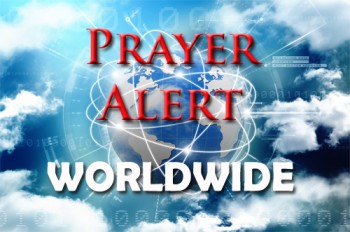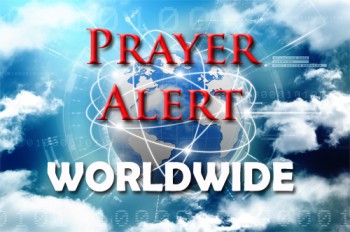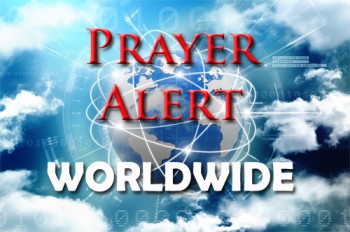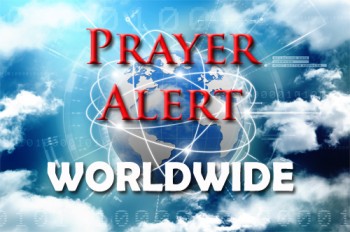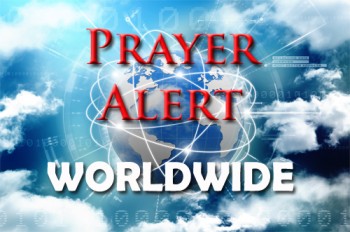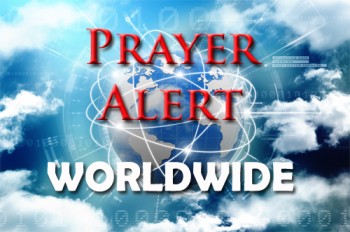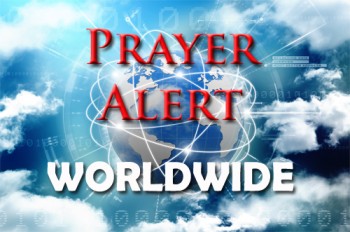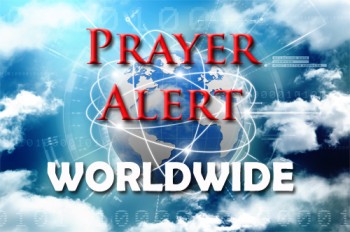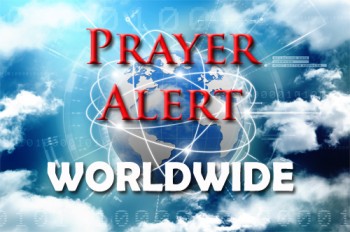Displaying items by tag: Asia
Israel: Netanyahu - Hezbollah is playing with fire
Following an attempted cross-border attack on 27 July by Hezbollah, Benjamin Netanyahu and defence minister Benny Gantz addressed the nation, threatening the Lebanese terror group and its host nations with a decisive counter-strike. ‘Hezbollah is playing with fire. Any attack against us will be met with great strength,’ said Netanyahu. Lowering his face mask, Gantz also addressed reporters, stating, ‘Israel is determined to prevent any threat to our sovereignty, our soldiers, and of course our citizens.’ They spoke after Hezbollah operatives tried to breach the Israel-Lebanon border, exchanging fire with IDF troops during an hour-long stand-off. We can pray, according to Psalm 44, for God to deliver His people from their oppressors, and put to shame those who hate Israel. May Israel praise God all day long and give thanks for ever.
Asia / USA: floods
Last week you prayed for South Asia’s humanitarian crisis with 9.6 million people affected by monsoon floods (three times more deaths than last year). This week floods took a turn for the worse in Nepal. In China relentless heavy rains have pummelled areas for a month. Yangtze River areas are overwhelmed, causing anxiety along the world's largest hydroelectric power plant, the 2.3-km Three Gorges Dam Already, 40 million people have been uprooted and 400+ rivers have overflowed. The dam, 300 km west of Wuhan, threatens to flood the first city to have been hit by coronavirus. In Texas, Hurricane Hanna has left some areas ‘totally under water’ and knocked out power across a region already reeling from a surge in coronavirus cases. Pray for communities with strained health care systems caused by coronavirus now airlifting patients to larger cities or areas away from floods.
Muslim-background believers
Since the 1960s, there has been considerable growth of conversions from Islam to Christianity. Most of these conversions have been to forms of evangelical or Pentecostal Christianity, and some converts claim to remain in some way both Muslims and followers of Jesus. Pray for the continued growth of mission agencies taking the good news to those who have not heard it. Muslim-background missionaries are vibrant Christians even though most of them are hated by their home countries and Muslim leaders, and are ostracised, beaten, and murdered by their families and neighbours: see Pray for God to continue to strengthen the endurance of new Christians as they evangelise, preach and demonstrate God’s love into the darkest corners of Islam. Converts from Islam face insurmountable questions on an almost daily basis, such as ‘I have more than one wife, what do I do?’ or ‘How can I support myself now my family has rejected me?’ See
Hong Kong: politics and church
At least twelve well-known political opposition figures, veterans, and lawmaker activists have been barred from running in the legislative council elections; the government warned that more hopefuls, including further lawmakers, could still be banned. Hong Kong's pastors are in the spiritual trenches of this growing fight. More than one million Christians are choosing between the ‘blue’ pro-government camp and the ‘yellow’ opposition. Most young churchgoers support the pro-democracy protests. Pray for God to protect and show the pastors His way forward, as they lead the church through the current struggles. Pray for young protesters facing moral dilemmas: ‘As a Christian, violence is wrong, so can I throw bricks? An oppressive government is also wrong, shall I break laws to protest against injustice?’
Mariam: rescued by Jesus
Mariam was abused as a young girl. As a teen, she took twelve pills a day to treat her depression. She was an atheist, believing that no god would allow her to suffer so much. The betrayal by her father and abuse by another man left Mariam hating men. Without hope, she tried suicide five times. But Jesus rescued Mariam! To listen to the amazing story of how she experienced Christ’s presence in wonderful ways and how he led her in a ministry to Muslim women and girls, click the ‘More’ button.
Saudi Arabia: Hajj - 29 to 31 July
The Hajj is one of the five pillars of Islam that all Muslims must perform at least once in their lifetime if they are able. On the Hajj Muslims seek the forgiveness of sins and to deepen their allegiance to Allah. In Luke 7, Jesus said to a sinful woman, ‘Your sins are forgiven: your faith has saved you; go in peace’. Jesus has the authority and power to forgive all of our sins through his atoning sacrifice on the cross and His resurrection. 1.8 billion Muslims in the world today reject Jesus as a Saviour. Instead, they go on the Hajj pilgrimage to Mecca in Saudi Arabia in order to earn forgiveness of sins from Allah. A phrase used in most Arabic conversations is ‘al-ḥamdu li-llāh’ - literally, ‘Praise be to God’. Pray for people to truly know God and praise Him when they use this phrase. See also
Yemen and Syria: updates
Yemen, currently home to the world’s worst humanitarian crisis, has millions of people extremely vulnerable to coronavirus. Even before the pandemic, 80% of Yemen’s population needed aid. The spread of coronavirus is difficult to track with very little testing. Sometimes the only way to assess the severity of an outbreak is by how busy the gravediggers are. In parts of Yemen gravediggers are overwhelmed. Coronavirus has caused a reduction in funding for aid programmes. The UN has been forced to close nutrition, hygiene and sanitation programmes (see). Doctors in Syria are preparing for ‘an explosion’ of coronavirus in large overcrowded settlements. Only 64% of hospitals are functioning due to shortages of trained staff. 70% of health workers have fled Syria. Awareness of coronavirus danger is extremely low in some areas, so food and medicine are prioritised for people in poverty, not soap and hygiene. See
Floods cause humanitarian crisis
A humanitarian crisis is deepening in South Asia as new figures reveal that over 9.6 million people have been affected by monsoon floods, devastating large areas of India, Bangladesh and Nepal. Pray for the millions of people marooned in their homes, with crops destroyed by the worst floods in recent years. This year’s monsoon has come at the height of a deadly global pandemic. Tragically, already 550 people have lost their lives. Close to one third of Bangladesh has already been flooded, with forecasts of worse flooding in the coming days. Pray for God's comfort to be over those living in fear of worsening weather and deadly pandemic enemy. Pray for those mourning the death of friends and family killed by landslides, drowning and sickness. Pray also for the aid agencies and the various ministries of disaster management to have clear communication strategies to work in united support of the vulnerable.
Christians neglected in aid distribution
Imagine you’re a Christian family in a Hindu village. It’s very likely neighbours are socially boycotting you. Even when there isn't a lockdown, you’re not allowed to buy from the local shop or draw water from the local well. You get food and daily necessities from nearby Christians or go to villages where the opposition isn’t so strong. But now your village is in lockdown. You’ve lost your income. Aid is being distributed to the local shop or the local village committee and they won’t give you the food, not even when you have a food ration coupon. The chances are that police won’t listen to Christian complaints and even accuse you of trying to convert Hindus or even ‘Don’t follow Jesus. Just do what everybody else does.’ Please pray for God to soften the hearts of those denying essential food and aid to Christians.
Iran: military alliance with China
Iran intends to build a military base in the Indian Ocean to protect fishing and commercial vessels from piracy and ‘foreign ships’ (referring to the US-led multinational naval task force currently protecting Gulf shipping from Iranian interference). A new agreement will give China access to Iranian ports. China is reportedly planning to build a new military base near Iran’s Chabahar port to enable the Chinese navy to monitor the activities of the US navy, which protects shipping passing through the Strait of Hormuz, one of the world's most important economic waterways. Any expansion in Iranian and Chinese military activity in the region would impact on the jointly-administered US / UK base on the island of Diego Garcia, one of the most important US military assets in the region. Tehran also plans to sign a $400 billion trade deal with China, which includes closer military cooperation between them to counter ‘Washington's dominance’.
